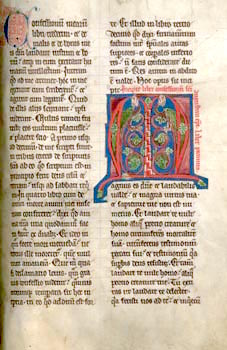
This is a longer post than normal, even for the Deuteronomy series. If you have time read it all the way through, or come back to it. There should be a second part by Matt, the other Quest member, hopefully that will be soon (hi Matt!).
All comments are welcome.
Promises of bloodshed, war and total savagery, that might be the first impression of Deuteronomy chapter seven for a person looking from without; especially so if a person comes to the Bible presupposing it as a useless, or even horrible book. But this isn't the entire case, Deuteronomy chapter seven, understood in its context, is a loudspeaker giving voice to God's elective love and holy justice. I'll look at these two parts of the story somewhat more systematically in this post, so to provide a very clear picture of what, I see, as the heart of chapter seven.
First, I should say that the two prominent points of Deut. 7 (elective love and holy justice) all hinge on God as the initiator, sustainer, finisher. What this means is that God is the "prime mover"--to borrow an Aristotelian phrase. God sets Israel's conquest of the promised land into being and opens opportunities for them to receive ownership of the promised land. Therefore everything that Israel apparently accomplishes, they in fact do not; Israel, in the Old Testament, is always provided for in times of provision and punished in times of exile. In the OT Israel and God have a Parent/Infant relationship. This is often so clear, throughout the Bible, that we often gloss over it, but if we read carefully we understand that it is "when the Lord God brings [Israel] into the land [...] he clears away many nations before you" (ch.7 v.1); it is God who "brings" and "clears". There are many other verses, in ch. 7 alone, that indicate God as the sole provider for Israel; for the sake of time though I will trust this first verse will suffice.
We have a great window into understanding God's elective love when we read in v.7, "It was not because you were more numerous than any other people that the Lord set his heart on you. For you were the fewest of all peoples. What we see here is that God chose a nation that was puny in comparison to Egypt and the Canaanites (the inhabitants of the promised land). We rightly infer a few things here, God's omnipotence allows him to even use the weakest people group in accomplishing his plan, he therefore receives all the more glory. But also, we see God's love for a marginalized people group along with his desire to see them to a stable future, securing them, if they continue to follow him, in a good land (v.8-9, v.12-15). To step on a few toes, Israel is the greatest 'affrimative action' project ever put into motion: a damaged and hurt people group placed in a position of stability by grace.
In Deut. 7 holy justice is seen through God's promise of Israel's victory. When we read in v.2, "[...] and when the Lord your God gives them over to you and you defeat them, there you must utterly destroy them," we become instantly outraged, "What?! That isn't the God I know. I thought God was only about love? Surely this isn't love." we say. The response to our first reaction should always be a quest for a deeper level of understanding. Only then can we begin to see that if a totally righteous God declares his justice against an evil nation (ch.9 v.5), Christians must as assume that God is acting justly. Just as the man firmly rooted on this earth can never grasp the gravitational pull of the sun because of his detachment from it, us, in our sinfulness often forget the
gravity of our sin, we focus on the 'here and now' of daily interactions. If we were to understand the grievances we cause each other and God we would begin to see that it is only by grace that we continue living in the first place. NC State Univ. Professor John Bowker writes, "There is no 'might is right' view of God in the Hebrew Bible: war is always a judicial business [...] Indeed God never fought on Israel's side at all. The question was always whether Israel was about to fight on God's side, the side of justice" (88
The Complete Bible Handbook). Then Bowker writes, "If the reason for war is justice, then its aim is peace" (89). So we see that peace is the ultimate aim of God's heart, but justice cannot be skirted in the acheivement of peace. So God decides to take Israel out of the pit of Egypt and crown them with compassion because he loves and has chosen Israel (election) but also because he desires that justice take place in Canaan (ch.9 v.5).
But this part of the post cannot end here, for what would that mean about our present situation, our historical context. Is war right? Who decides who deserves justice? Here we must understand that God in Deut. ch.7 is working in culture; since God desires to bless Israel with the promised land it must be achieved within an ancient near-eastern historical context, anything else and the unfolding fabric of God's sovereign story would be disturbed. We might continue cringing, while looking through the stylish eye-glasses of our post-enlightenment context, but in the end all our cringing will do us no good, simply put, this was how land was exchanged; if two parties desired it warfare happened, and warfare was common. Now though God has poured out his complete justice on the cross, so that mercy flourishes like a ripe fruit for those who turn away from themselves and enter into covenant with Jesus Christ.

























